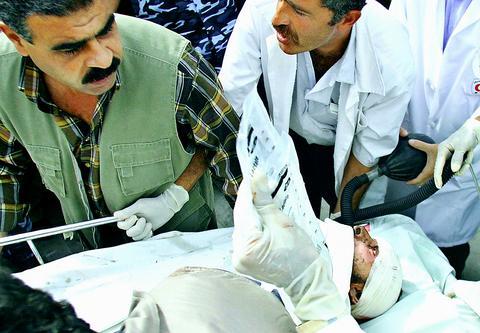Israel's massive military operation into the northern Gaza Strip shows no sign of a let-up after two deadly weeks that have seen 111 Palestinians killed, mainly children, and Qassam rockets still being fired into Israeli territory.
Israeli Prime Minister Ariel Sharon has defied the advice of senior military commanders to withdraw from Gaza, Israeli media reported Monday.

PHOTO: AFP
Senior officers were reported to have told Sharon that Operation Days of Penitence, launched 14 days ago in a bid to halt rocket attacks on southern Israel, had now met its main objective.
But Sharon, keen to deliver a decisive blow to Gaza-based militant factions before next year's planned pullout, told top brass that they must push on with the operation.
Much of the operation has been centered on the Jabaliya refugee camp in the north of the territory. But Haaretz cited senior officers as saying troops were being exposed to an unnecessarily high risk by remaining in the densely populated camp and that rocket launchers had also been moved from Jabaliya.
A total of 111 Palestinians have been killed in Gaza since Days of Penitence, which is the army's deadliest offensive in the territory, began on Sept. 28.
Jabaliya, home to 103,646 ref-ugees, is a squalid network of narrow streets where most people are more concerned about the lack of electricity, running water and food than Qassam rockets.
"It's terrible," said Mohammed. "You go to the hospital and see horrible injuries and children killed by indiscriminate firing directed by Israeli drones. Some people in Jabaliya don't even have water or milk to feed babies."
The UN Relief and Works Agency for Palestine Refugees (UNRWA), which is responsible for the camp, has only been able to deliver three convoys of humanitarian aid, with a fourth due yesterday.
Those convoys will feed around 9,000 people.
"The situation around the camp is extremely bad," said Lionel Brisson, director of UNRWA operations in Gaza. "We're doing less than expected because we cannot bring in supplies."
Brisson questioned the Israeli tactic of collective punishment.
"The regime of closures is one of strangulation," he said. "Israelis are invoking security reasons but it is affecting the whole population, and making people more desperate ... I'm not convinced it'll work.
"There is a general fatigue in the [Gaza] population. They want peace, to live in peace.
"The economic situation in Gaza is very negative. Some 70 percent of the population are living below the poverty line ... and unemployment stands at 44 percent," Brisson said, adding that 120 houses a month are being demolished by Israeli forces.
Israeli Foreign Minister Silvan Shalom indicated Monday that the operation in Jabaliya would soon be over although Defense Minister Shaul Mofaz was more circumspect.
"We are in the last stages of the operation in Jabaliya after the army registered a clear success and hit the terrorist infrastruc-ture," Shalom told reporters.

‘SHARP COMPETITION’: Australia is to partner with US-based Lockheed Martin to make guided multiple launch rocket systems, an Australian defense official said Australia is to ramp up missile manufacturing under a plan unveiled yesterday by a top defense official, who said bolstering weapons stockpiles would help keep would-be foes at bay. Australian Minister for Defence Industry Pat Conroy said the nation would establish a homegrown industry to produce long-range guided missiles and other much-needed munitions. “Why do we need more missiles? Strategic competition between the United States and China is a primary feature of Australia’s security environment,” Conroy said in a speech. “That competition is at its sharpest in our region, the Indo-Pacific.” Australia is to partner with US-based weapons giant Lockheed Martin to make

BEYOND WASHINGTON: Although historically the US has been the partner of choice for military exercises, Jakarta has been trying to diversify its partners, an analyst said Indonesia’s first joint military drills with Russia this week signal that new Indonesian President Prabowo Subianto would seek a bigger role for Jakarta on the world stage as part of a significant foreign policy shift, analysts said. Indonesia has long maintained a neutral foreign policy and refuses to take sides in the Russia-Ukraine conflict or US-China rivalry, but Prabowo has called for stronger ties with Moscow despite Western pressure on Jakarta. “It is part of a broader agenda to elevate ties with whomever it may be, regardless of their geopolitical bloc, as long as there is a benefit for Indonesia,” said Pieter

TIGHT CAMPAIGN: Although Harris got a boost from an Iowa poll, neither candidate had a margin greater than three points in any of the US’ seven battleground states US Vice President Kamala Harris made a surprise appearance on Saturday Night Live (SNL) in the final days before the election, as she and former US president and Republican presidential nominees make a frantic last push to win over voters in a historically close campaign. The first lines Harris spoke as she sat across from Maya Rudolph, their outfits identical, was drowned out by cheers from the audience. “It is nice to see you Kamala,” Harris told Rudolph with a broad grin she kept throughout the sketch. “And I’m just here to remind you, you got this.” In sync, the two said supporters

Pets are not forgotten during Mexico’s Day of the Dead celebrations, when even Fido and Tiger get a place at the altars Mexican families set up to honor their deceased loved ones, complete with flowers, candles and photographs. Although the human dead usually get their favorite food or drink placed on altars, the nature of pet food can make things a little different. The holiday has roots in Mexican pre-Hispanic customs, as does the reverence for animals. The small, hairless dogs that Mexicans kept before the Spanish conquest were believed to help guide their owners to the afterlife, and were sometimes given